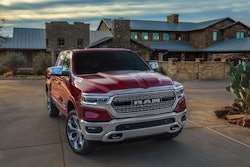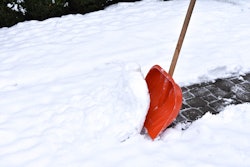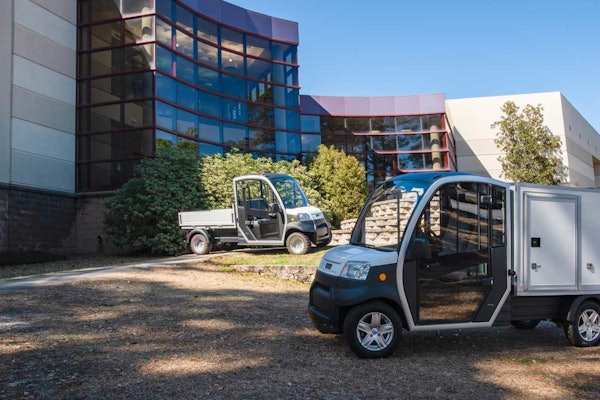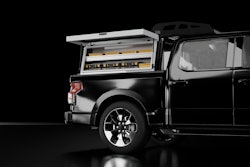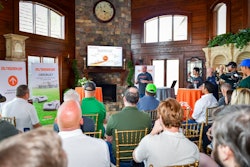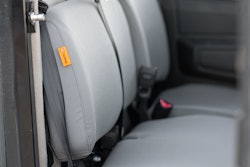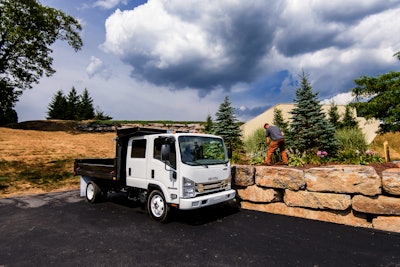 Photo: Isuzu
Photo: IsuzuTrucks are one of the most important pieces of equipment when it comes to operating your landscape or lawn care business.
When it’s time to think about adding new ones to your fleet, there is a lot to consider. As your business evolves and changes, you may even debate changing your fleet’s makeup entirely. Below are some of the aspects you need to evaluate to make the best choice for your company.
What matters most?
By knowing the right questions to ask, you can avoid getting sidetracked by some of the bells and whistles that are available and focus on what is truly important for your workhorse vehicles.
“It all starts with safety,” says Tony Bass, founder and CEO of Super Lawn Technologies based in Fort Valley, Georgia. “You need to understand the cargo weight and the cargo volume that you need to carry. The cargo volume is related to, generally in the lawn and landscape business, the number of machines or lawn mowers, the sizes of those machines in terms of width, height length and, of course, weight. If you do not understand what the total weight cargo capacity is, it’s impossible to properly size the vehicle to create a safe towing or hauling situation.”
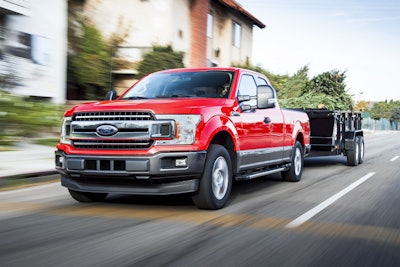
Bass says the next question you need to ask is how many people are going to be riding in the vehicle. Your crew sizes will determine if you need a single cab or a crew cab.
“The critical decision on crew cabs revolves around your typical crew size and the duration of the number of employees needed on any given work site,” says George Survant, senior director of fleet relations for the National Truck Equipment Association (NTEA). “A second truck will give you the ability to dispatch a portion of your manpower to another work site rather than having a portion of your crew underutilized for the entire length of the job.”
Other questions Survant says landscapers should ask when searching for the best vehicle include how will it make your work more effective and if the vehicle is likely to be reliable.
“Are the operating costs for the vehicle optimized for the type of jobs you perform?” Survant says. “Is the vehicle easy to drive and operate? Driver fatigue contributes to poor safety records.”
Rise of the cab overs
One trend that is growing in popularity is the use of box trucks over pickup trucks.
“A lot of landscapers are using them from the standpoint of if they can keep all of their equipment in there and it’s secured and it’s all in one spot,” Tabel says. “It also keeps everything away from the elements as they’re facing rain, snow or whatever they may face.”
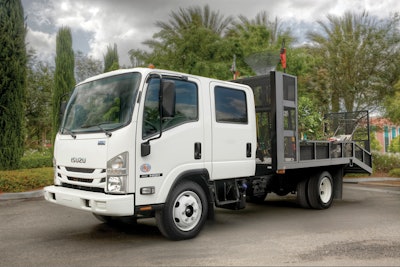 Photo: Isuzu
Photo: IsuzuBass agrees that box trucks are becoming more popular among landscapers, as it eliminates the need to tow a trailer.
“Most lawn and landscape contractors recognize that towing trailers is a difficult job to train for and any time you put a trailer behind a truck, it takes up more space on the road,” Bass says. “You have more tires on the ground. You have more lights and electrical connections to maintain. The idea of mobilizing from job to job without a trailer typically means you move around town faster, and it’s much easier to train drivers when you don’t have to ask them to back up trailers.”
For landscape companies that need to be able to maneuver through tight spaces or urban areas, a cab over can be a good fit.
“Capacity and turn radius are the key decision factors in selecting a cab over rather than a truck with a trailer,” Survant says. “Cab overs are very advantageous when designing a very compact truck designed to operate in close spaces and higher traffic situations.”
Customized trucks
Another option to consider are the highly customized trucks, like those that Bass’s company creates for landscapers. These trucks come with accessories such as tool boxes, fueling stations and more.
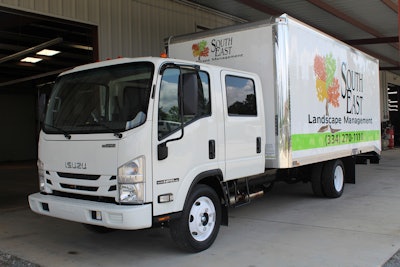 Photo: Super Lawn Technologies
Photo: Super Lawn Technologies“Work trucks can incorporate a wide variety of tools and support systems,” Survant says. “Pumps for fluids, containers for fluids, secure tool boxes and onboard hydraulic pumps to drive specialized tools along with generators for power are good reasons to build a custom truck bed. When those options improve customer service and speed of service delivery, it is easy to establish the business case for investing in a custom truck bed.”
Bass says that landscapers should consider investing in a customized truck bed when they are trying to find ways to improve their productivity.
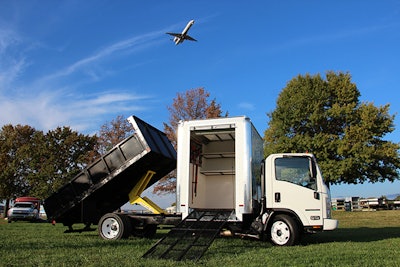 Photo: Super Lawn Technologies
Photo: Super Lawn Technologies“Anytime you can remove non-productive time like stopping at the gas station, you can improve the efficiency of the crew, the volume of dollars the crew generates,” Bass says. “One of the specialty items we put on these Super Lawn Trucks is an onboard fueling station, which allows the crew to pull into the gas station one time per week and then be able to carry enough fuel to keep that crew going all week without a return trip to the fuel station. Many of them stop daily for fuel and most stop at least three times a week, and so when you convert three times a week to just one stop a week with a three-man crew, you will improve your company’s financial productivity by $2,500 simply by converting three fuel stops to one a week.”
One particular type of customized truck is one with a dump body. These trucks are best suited for landscapers who are frequently carrying bulk supplies such as mulch, sand or stone or when they are collecting large volumes of debris or construction waste that needs to be dropped off.
“Dump bodies, as with other specialized tools, are most useful when your work demands this type of capability often and the mechanized dump action will save the landscaper significant labor dollars on the job,” Survant says.
Truck and trailer
Of course, there is the traditional standby of the truck and trailer set up, but even here you have to decide if you want to go for an open-air trailer or an enclosed one. Each type comes with its own pros and cons.
Open-air trailers are easy to load and unload. These trailers are often very inexpensive and tend to be lightweight.
Some of the drawbacks that Survant highlights are the fact that there is less security for the loads and improperly secured loads can fly out of the trailer into traffic.
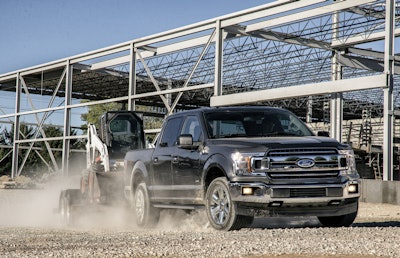
As for the pros of using an enclosed trailer, landscape contractors can secure their equipment from the environment and theft as well as enjoy a free advertising opportunity.
“When you purchase an enclosed truck or trailer, you immediately get the benefit of billboard sized advertising, and that is worth $18,000 a year in advertising benefits to a typical contractor who works full time in this industry,” Bass says. “The great news is, you’ll only spend $2,000-4,000 on that billboard sign that is going to stay with you for five to 15 years, so the advertising benefits can easily be articulated at a 10-year benefit of $180,000 of advertising benefits that cost you maybe $4,000. That is extraordinary and is an impact for the contractor that will never be understood until they do it.”
The cons that come with an enclosed trailer means that it can sometimes be harder and more time consuming to load and unload, according to Survant, and there is more sheet metal to take care of with paint and rust prevention.
New or used?
As for whether it’s a good idea to invest in used vehicles for your fleet, Tabel says it’s always a good idea to buy a used vehicle and says he knows many customers who buy everything used because it fits their business model.
Survant says landscapers might opt for used vehicles if you need one sooner than a new one is readily available or when your vehicle demand exceeds your available capital.
“It’s a good idea to buy a used vehicle if a) you work part time in the industry,” Bass says. “It’s okay to buy a used vehicle b) if you have really bad credit and you cannot get approved to purchase something new, c) if you’ve been to Dave Ramsey’s class and believe that buying a new vehicle is a sin, then it’s okay to buy a used vehicle. If you make your living with your equipment, you should buy new equipment because new equipment comes with warranties and guarantees, and you will not be out of pocket on expensive repairs preventing you from doing your job.”
Bass says that contractors need to understand that used vehicles do not cost less than new vehicles.
“The only reason the purchase price might be less is because a certain portion of the useful life of the vehicle has already been used up,” he says. “Trucks just like lawn mowers and skid loaders are depreciating assets. The more you use them, the lower the price will be to acquire them because a portion of their useful life has already been used up.”
“The most practical and financially effective fleets have an average age of about ½ of the economic life of the vehicles,” Survant says. “For example, if you typically keep your vehicles seven years, an optimum average age of your fleet would be 3 ½ years old. In those circumstances, a significant portion of your fleet is highly reliable and is operating within the warranty period of the trucks.”

